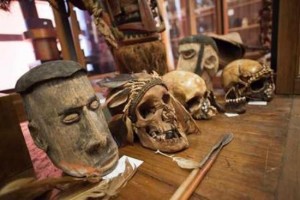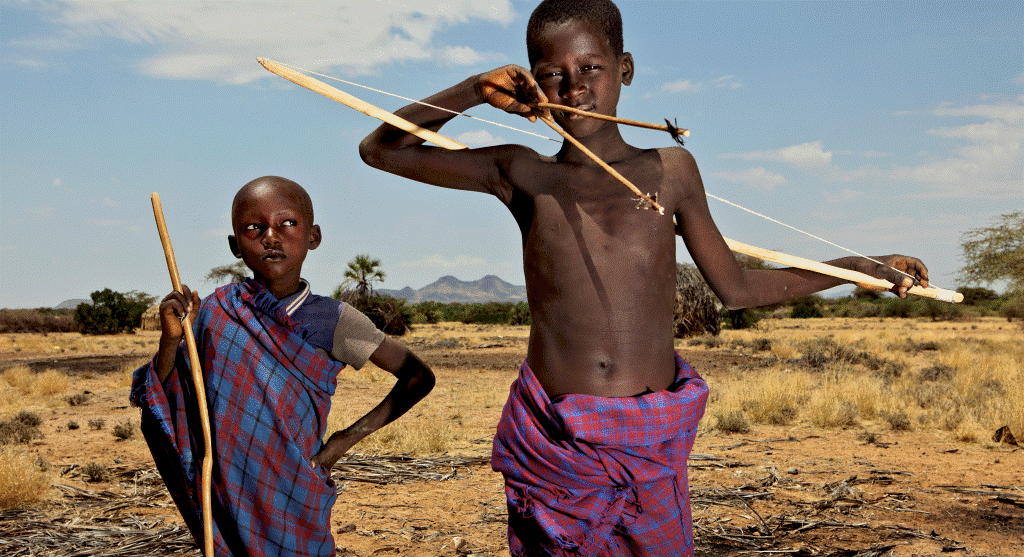Nearly 24 hours of wind have stripped most of the remaining leaves from the trees. Suddenly it is winter, such as it is in the lowlands of northern California.
 The air is very clear, and the mid-day light on the stream and stream-banks is extraordinarily beautiful. The sun is warm enough to sit on the ground, and quiet enough in this part of the park, though it’s in the middle of the city, to allow communion with nature, and with humankind.
The air is very clear, and the mid-day light on the stream and stream-banks is extraordinarily beautiful. The sun is warm enough to sit on the ground, and quiet enough in this part of the park, though it’s in the middle of the city, to allow communion with nature, and with humankind.
Passive observation grows, unseen, into unwilled attention, and a meditative state (which is really the movement of negation) ignites. Just then an older woman, leading four 10 or 11-year-old boys carrying big white buckets, walks into the picnic site across the creek.
She opens an enclosed area where they’re re-growing native plants, and the boys traipse down to the stream to scoop water. They see me but act like I’m not there, so I hold a wave, and one waves back shyly. Another, a longhaired rascal wearing a baseball cap in the backwards fashion, then stands on a log and keeps waving impishly.
I play along and when he returns to get another bucket of water, he hides behind a tree, poking his head out on one side and waving on the other in a fairly good Charlie Chaplin routine. I laugh.
The woman, who either doesn’t understand the game, a little sternly says, ‘What on earth are you doing?’ Too bad she missed his routine, I think, and wonder if the boy’s parents or teachers appreciate his mischievous antics. The kid has the makings of a comedian or actor.
Besides knowledge and skill, parents and teachers since time immemorial have communicated and inculcated children with the traditions of a culture. Now that tradition has lost all meaning and coherence, is it possible to create a new kind of culture, flowing from insight? Can the way of insight be taught or conveyed to children?
In ancient times, and not long ago in many parts of the world, each cultural tradition was completely distinct and whole. Tradition wasn’t something that a people had; it was the total way of life in which people were completely immersed.
When anthropologists studied distinct cultures in South America or Africa In the 19th and early 20th centuries, they couldn’t ask people about their traditions, because the people wouldn’t have known what they were talking about. Traditions were all encompassing–a lived and breathed reality. The only way anthropologists could begin to understand them was by immersing themselves in the cultures they were studying.
Tradition in the anthropological and even historical senses of the word no longer exists, except as belief systems and  mores that people identify with and cling to in a world of dizzying change.
mores that people identify with and cling to in a world of dizzying change.
Wherever children live on the planet now, their primary culture is the digital world of the net, with all its bits and bites of disconnected content. Of course, there are exceptions, pockets of traditional culture in remote places, but they are under assault and breaking down, and parents are unable to pass previously coherent and cohesive traditions onto the new generations.
Now, in North America and increasingly the world, we have the worst of all worlds. On one hand the ‘culture’ of individualism carries with the implicit belief that the culture is not the air we breath, but a sea we float on, each person in their own separate boat.
On the other hand, we all know (though few emotionally see) how toxic the culture has become, and how much it affects and infects our children. Attempts to redress the problem however, usually go no further than a password lock on the net and TV for young children.
There is no point in lamenting what is past, or trying to hold the remnants of tradition together, like fundamentalist Christians and Islamists do. That just warps people even more.
On the liberal side of the spectrum, no gathering and stitching of the world’s existing traditions can make a whole, because each intact cultural tradition was the whole to a given people. ‘Diverse traditions’ can only correspond to fragments.
The soil of humankind, which is tens and even hundreds of thousands of years old, is eroding fast. The pace and disconnectedness of technological life, the pernicious effects of our machines and especially the computer, and the juggernaut of globalization are some of the reasons for this radical break with the past.
Can humankind move beyond tradition, and if so, what can take its place?
The continuity of thought precludes the flowering of insight. Ancient peoples, and the few intact indigenous groups that remain today, had their own insight, but it was deeply symbolic, embedded in the past as tradition.
To my mind, we have to be mindful and respectful of tradition where it still has any meaning and coherence. But post-modern people have to leave tradition behind and consciously replace it with the awakening of insight if we are to grow as individuals, and give children any chance of being whole human beings.
Martin LeFevre

